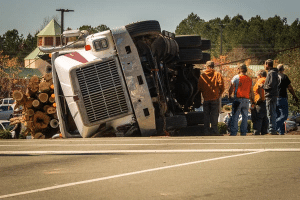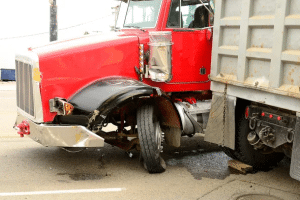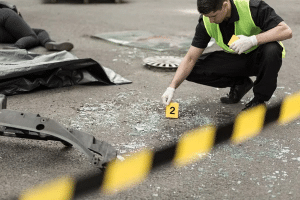
When an accident occurs involving a truck, the aftermath can be devastating. The sheer size and weight of trucks magnify the impact on smaller vehicles. Yet, commercial truck drivers sometimes leave the accident scene without providing assistance or information. This act not only jeopardizes the safety of others but also leads to legal repercussions for the truck driver.
If you have been involved in a truck hit-and-run accident, you need an experienced truck accident attorney to represent you. At Good Guys Injury Law, an experienced truck accident lawyer from our law firm would be honored to represent you.
If the commercial truck driver leaves the scene of an accident, be sure to seek medical care for your truck accident injuries. Then, ask for a copy of the police report and schedule a consultation with our law firm. We fight for truck accident victims and would be honored to fight for you as well.
Table of Contents
Importance of Staying at the Scene of an Accident
Being present at an accident scene is not only a legal obligation but a moral one. The injured parties may require immediate assistance, and the truck driver can be crucial in offering help or contacting emergency services. Moreover, fleeing can be seen as an admission of guilt, making legal matters even more complicated for the driver.
In addition, staying at the scene ensures the accurate exchange of information. This can be vital for insurance claims, police reports, and future legal actions. Departing prematurely can also be seen as a lack of responsibility, negatively affecting public and professional perception.
When someone is injured, every second counts. The faster they receive medical attention, the better their chances of recovery. Hence, the truck driver’s presence is critical not only legally but from a humanistic point of view.
Common Reasons Why Truck Drivers Flee the Scene

There are several reasons a truck driver might choose to leave an accident scene:
- Fear of Consequences: The driver might fear facing legal issues or losing their job. They could worry about being found at fault or face incarceration.
- Lack of Awareness: Sometimes, a truck driver might not realize they’ve been in an accident due to the vehicle’s size. A minor collision could go unnoticed, especially in scenarios with smaller cars or objects.
- Intoxication: If under the influence, a driver may reason. Their judgment could be better, leading to better decisions. They might be fearful of getting caught and facing stricter penalties.
- Invalid License or No Insurance: Drivers without proper documentation might flee to avoid further legal complications. They may be operating without a valid license, or they might not have the required insurance coverage.
- Panic: In the heat of the moment, human instinct might kick in. Panic can make individuals act irrationally and impulsively. The driver might believe fleeing is the best option.
- Prior Legal Troubles: Drivers with a history might fear enhanced penalties. They may already have strikes against them.
Understanding these reasons doesn’t excuse the behavior but offers insight into why it occurs. Leaving an accident scene remains a grave mistake with legal and moral consequences.
Legal Consequences
A truck driver leaving an accident scene faces significant legal issues. For starters, it’s a crime in almost all jurisdictions. It could be a misdemeanor or felony charge. Beyond criminal charges, the driver exposes themselves to potential civil lawsuits from the injured parties.
Furthermore, running from an accident can exacerbate the situation. Even if the truck driver wasn’t initially at fault, fleeing can shift the blame onto them. It sends a message of guilt, even if that wasn’t the intention. The court and public opinion can be heavily swayed against someone who doesn’t stay to face the situation.
Criminal Penalties
Different states have varying laws regarding hit-and-runs. However, universally, they’re not taken lightly.
- State Laws and Variances: Every state treats leaving the scene differently. Some states might impose hefty fines, while others prioritize incarceration or community service.
- Felony vs. Misdemeanor Charges: The nature of the charges depends on the accident’s severity. If there are injuries or fatalities, the charge is usually a felony. If nobody was harmed, it might only be a misdemeanor. However, regardless of the classification, there are stiff penalties.
Understanding the legal implications is crucial. While there might be temptations or pressures to leave, the legal fallout is always worse if one doesn’t stay. Not only do penalties increase, but the act of fleeing can also be used against the driver in court.
Civil Liability
Beyond the criminal realm, civil liabilities arise when a truck driver flees an accident scene.
- Potential Lawsuits From Victims: Injured parties can sue for damages. These can include medical bills, lost wages, and emotional trauma. Leaving the scene often makes it harder to defend against these claims.
- Insurance Implications: Insurance companies might refuse to cover a driver who flees. This can lead to personal financial devastation. Higher premiums or policy cancellations are also potential consequences.
Facing a lawsuit can be financially draining. In addition, the act of leaving can be used as evidence of guilt, making the lawsuit even harder to defend. It’s crucial to understand these implications and make decisions accordingly.
Possible Defenses
If a truck driver does leave the scene, it’s vital to know the potential defenses available.
- Valid Reasons for Leaving the Scene: There are rare cases where leaving might be justifiable. Perhaps the driver felt in immediate danger or needed to rush to an even more critical emergency.
- Legal Protections: Everyone is entitled to a defense in court. Just because someone left doesn’t mean they’re automatically guilty. It’s important to consult with an attorney to understand one’s rights.
Although defenses exist, they’re often difficult to argue. It’s always recommended to stay at the scene and consult with an attorney afterward.
Consequences for the Trucking Career

A truck driver’s career can be severely impacted after leaving an accident scene. Firstly, their professional reputation is tarnished. People, including employers, view such actions as irresponsible and untrustworthy.
In addition, companies prioritize safety and compliance. When a driver flees an accident scene, it portrays them as a liability. This negative portrayal affects current employment and future opportunities in the industry.
License Suspension
A key consequence of fleeing the scene is license suspension. The driver’s ability to operate is legally revoked, sometimes for extended periods. Even if the suspension is temporary, the lasting effects on one’s career can be permanent.
Moreover, reinstating a suspended license can be complicated. There might be courses, fines, or other requirements to meet. Throughout this suspension period, maintaining a stable income can become a challenge.
Employment Termination
Leaving an accident scene can result in immediate job loss. Employers have a reputation to maintain, and harboring someone who flees goes against safety values. Besides, the legal and insurance complications can be a headache for the employer.
Losing a job is about more than just the immediate paycheck. It affects long-term career growth, retirement benefits, and even personal self-worth. It’s a setback that takes time and effort to recover from.
Impact on Future Job Opportunities
A hit-and-run incident remains on one’s driving and criminal record. Future employers will see this when considering a truck driver for a position. Many companies might hesitate to hire someone with such a mark on their record.
Reporting and Procedures After a Truck Accident
When involved in a truck accident, there are protocols to follow. These ensure the safety of all parties and protect the truck driver from potential legal issues. Following the proper steps can make a huge difference in the aftermath. Truck accidents must usually be reported to the FMCSA.
Immediate Actions After an Accident
After an accident, certain actions are essential for safety and legal reasons. You should take these steps:
- Stopping Safely: Always halt the vehicle in a safe location. Avoid obstructing traffic but remain near the accident scene. Use hazard lights to signal the accident to other road users if possible.
- Checking for Injuries: Safety is the top priority. Ensure you’re okay, and then check on others. If anyone is hurt, reach out for emergency medical attention. Some people might even suffer brain injuries.
- Contacting Law Enforcement: Always call the police. They’ll document the accident and provide an official report. This report is crucial for insurance and potential legal matters.
Following these steps ensures that everyone’s well-being is prioritized. It also aids in smooth legal and insurance processes.
Gathering Information
Accurate information gathering is crucial after an accident:
- Details of the Accident: Document what happened. Note the time, location, and events leading to the accident. This information aids in insurance claims and potential lawsuits.
- Witness Statements: Talk to any bystanders who saw the accident. They might provide a neutral perspective on what happened. Their statements can be valuable in legal scenarios.
- Documenting the Scene: Take photos and videos if possible. Capture damage, skid marks, and vehicle positions. This visual evidence can be crucial in understanding the accident dynamics.
Having a clear record of the accident can prevent future misunderstandings. It’s an essential step in protecting oneself legally.
Reporting to Employers and Insurance
Informing the right parties after an accident is essential:
- Company Policies: Every trucking company has accident protocols. Drivers should be familiar with these and follow them strictly. Immediate reporting might be a requirement.
- Notification Requirements: Insurance companies have timelines for reporting accidents. Delaying this can lead to complications in claims. Always inform the insurance company as soon as possible.
Maintaining open communication is vital. It ensures all parties are on the same page, reducing potential conflicts.
Truck Accident Hit-and-Run Investigations

The investigative process is extensive when a truck is involved in a hit-and-run. With the size of the vehicle and potential damage, authorities prioritize tracking down the responsible party.
Police Investigations
Law enforcement plays a critical role in hit-and-run incidents:
- Evidence Collection: Police gather evidence from the accident scene. This includes photographs, debris, and potential truck parts left behind. Such evidence aids in identifying the truck involved.
- Tracking Down the Driver: Using the gathered evidence, police work to locate the driver. They might check nearby surveillance or interview witnesses. This could uncover the truck’s license plate number.
The goal is to ensure justice is served and prevent future incidents. Police investigations are thorough and aim to ensure all parties get closure.
Role of Surveillance Cameras
Technology aids in tracking hit-and-run culprits:
- Traffic Cameras: These often capture accidents on busy roads. They can provide clear footage of the truck involved. Sometimes, they might even capture the license plate.
- Dashcams and Security Footage: Private recordings can be crucial. Dashcams from nearby vehicles might have recorded the incident. Local businesses might also have security footage that offers clues.
Utilizing technology can significantly speed up investigations. It provides a clear picture, making identifying the culprit easier.
Witness Cooperation
The public plays a significant role in hit-and-run investigations:
- Encouraging Public Assistance: Often, the police seek the public’s help. Someone might recognize the described truck or know something relevant.
- Witness Protection: In sensitive cases, witnesses might fear retaliation. Authorities ensure such witnesses are protected. This ensures they can come forward without fear.
Eyewitnesses provide a firsthand account of events. Their cooperation can be the difference between a successful and unsuccessful investigation.
What Our Truck Accident Lawyer Can Do for You
Being involved in a truck accident, especially a hit-and-run, can be overwhelming. That’s where Good Guys Injury Law steps in:
- Expert Legal Advice: We guide you through the legal maze. Understand your rights and the best course of action. We prioritize your interests at every step.
- Evidence Collection: Our team gathers all relevant evidence. This ensures a robust case in your favor. We’ll interview witnesses, collect recordings, and more.
- Negotiating with Insurance Companies: Insurance claims can be tricky. We ensure you get the compensation you deserve. Our team handles all communications, reducing your stress.
- Representation in Court: We stand by you if your case goes to trial. Our experienced lawyers fight for your rights.
- No Fee Until We Win: We prioritize your victory. Our payment structures ensure you only pay if we win.
At Good Guys Injury Law, we prioritize your well-being and rights.
Seek Legal Help After a Truck Accident | Call Good Guys Injury Law Today

If you’re a truck accident victim or facing repercussions after an incident, don’t go it alone. Legal matters are complex, and having professional guidance is essential. Good Guys Injury Law is dedicated to providing the support you need, ensuring justice is served.
Contact us today to schedule a free case consultation.
